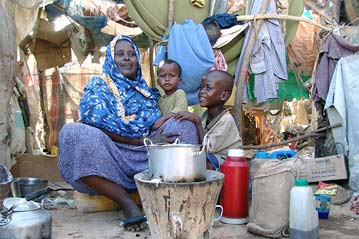UNHCR seeks to ease harsh conditions for IDPs in Somalia's Puntland
UNHCR seeks to ease harsh conditions for IDPs in Somalia's Puntland

BOSSASO, Somalia, September 25 (UNHCR) - When Ali Bare Mohamed and his family arrived in this stifling port town in north-east Somalia because of renewed fighting in Mogadishu, they were just escaping one kind of hell for another.
Along with other agencies, UNHCR has on several occasions this year drawn attention to the poor conditions for the thousands of displaced people who have made their way to Bossaso in Somalia's Puntland region, and urged the authorities to take steps to improve things. The refugee agency has also been working with its partners to help the displaced.
Ali had moved to Mogadishu early this year with his family after losing his livestock because of drought. They were soon on the move again, but tragedy struck on the long journey north to Puntland when one of Ali's nine children died.
In the Puntland capital of Bossaso, they found a buzzing town surrounded by crowded settlements housing some 28,000 internally displaced people (IDPs). Most fled their homes over the past 15 years to escape the unrelenting violence that has devastated Somalia since the overthrow of President Siad Barre in 1991. Others were displaced by the Indian Ocean tsunami of December 2004.
"They said there was peace in Bossaso, so we came," Ali said. That may be, but there is little else to be thankful for. Most of the IDPs live in flimsy, inflammable shelters made of sticks wrapped with cardboard and rags.
There are hardly any schools, few health and sanitation facilities, and shortages of food. Settlements like these are widespread over Somalia: some 400,000 Somalis have been displaced by the various outbreaks of fighting. After visiting one of the settlements here earlier this month, Marjon Kamara, the Geneva-based head of UNHCR's Africa bureau, said the needs of the IDPs were "immense."
Denis McNamara, the special UN adviser on internal displacement, was also critical earlier in the year. "Their conditions in the so-called settlements are substandard in every respect. They don't have the basic amenities that they should have," McNamara said during a visit to Puntland. He urged local authorities to allow more international aid agencies to help in the settlements.
Land provision and sanitation are particularly acute problems. "We are constantly moving because landlords evict us, even though we are paying rent, and our tukuls [shelters] are destroyed by frequent fires," Abdallah Osman, vice-president of the IDP management committee in Mingis settlement, told UNHCR's Kamara.
Wealthy local landowners recently agreed to lend five plots of land for use by the IDPs over the next 10 years. UNHCR has joined forces with UN-Habitat, UNICEF and the Danish Refugee Council to move 120 families to one of the sites, helping to decongest the settlements. The other sites will be developed when funds are available.
"We are working with our partners on the extension of water supplies and design of shelters to make the plots viable. We are also establishing criteria to identify the families who will move first," Kamara said, adding that the process had to be "transparent, fair and all-inclusive."
Despite the land problems, Osman said "the biggest problem is the lack of toilets in the camps." The local authorities recently changed their minds about the construction of pit latrines in Mingis, saying landowners were reluctant to give up land for this purpose. Only seven latrines were built out of a planned 70.
Kamara urged local officials to take action. "There are multiple problems around the issue of latrines in the settlements. It is both a health and security issue. Every one will be affected if there is an outbreak of disease in the settlement and for the women, there is the added problem of sexual abuse," she said.
Meanwhile, work is beginning on the new camp. "Roads and water pipes are being extended, a police station and a school will be built," said Joana Cameria, a Habitat planner. "There will even be street lights equipped with solar panels," she added. But the UN cautions that the process of decongesting the camps will take several years. Only 120 families, selected in a process involving the community, will move in to the first site.
Ali and his family hope that they will be among the lucky ones. For the moment, they are living in a meagre shelter lent to them by other IDPs. Ali hopes to earn enough money to buy the materials to set up his own tukul.
By Catherine-Lune Grayson and Millicent Mutuli in Bossaso, Somalia








